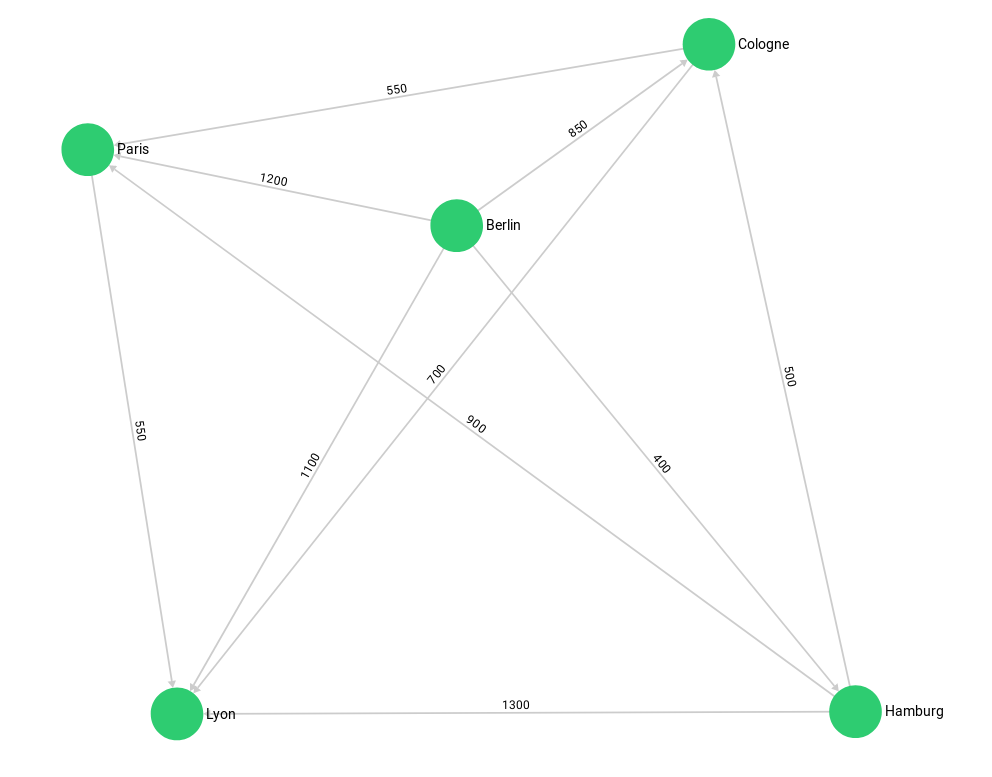Combining Graph Traversals
Finding the start vertex via a geo queryPermalink
Our first example will locate the start vertex for a graph traversal via a geo index.
We use the city graph and its geo indices:

Permalink
arangosh> var examples = require("@arangodb/graph-examples/example-graph.js");
arangosh> var g = examples.loadGraph("routeplanner");
We search all german cities in a range of 400 km around the ex-capital Bonn: Hamburg and Cologne.
We won’t find Paris since its in the frenchCity collection.
Permalink
FOR startCity IN germanCity
FILTER GEO_DISTANCE(@bonn, startCity.geometry) < @radius
RETURN startCity._key
Bind Parameters:
{
"bonn": [
7.0998,
50.734
],
"radius": 400000
}
Result:
[
"Cologne",
"Hamburg"
]
Lets revalidate that the geo indices are actually used:
Permalink
FOR startCity IN germanCity
FILTER GEO_DISTANCE(@bonn, startCity.geometry) < @radius
RETURN startCity._key
Bind Parameters:
{
"bonn": [
7.0998,
50.734
],
"radius": 400000
}
Explain:
Query String (119 chars, cacheable: true):
FOR startCity IN germanCity
FILTER GEO_DISTANCE(@bonn, startCity.geometry) < @radius
RETURN startCity._key
Execution plan:
Id NodeType Est. Comment
1 SingletonNode 1 * ROOT
7 IndexNode 3 - FOR startCity IN germanCity /* geo index scan, projections: `_key` */
5 CalculationNode 3 - LET #3 = startCity.`_key` /* attribute expression */ /* collections used: startCity : germanCity */
6 ReturnNode 3 - RETURN #3
Indexes used:
By Name Type Collection Unique Sparse Cache Selectivity Fields Ranges
7 idx_1733159490201583619 geo germanCity false true false n/a [ `geometry` ] (GEO_DISTANCE([ 7.0998, 50.734 ], startCity.`geometry`) < 400000)
Optimization rules applied:
Id RuleName
1 move-calculations-up
2 move-filters-up
3 move-calculations-up-2
4 move-filters-up-2
5 geo-index-optimizer
6 remove-unnecessary-calculations-2
7 reduce-extraction-to-projection
42 rule(s) executed, 1 plan(s) created
And now combine this with a graph traversal:
Permalink
FOR startCity IN germanCity
FILTER GEO_DISTANCE(@bonn, startCity.geometry) < @radius
FOR v, e, p IN 1..1 OUTBOUND startCity
GRAPH 'routeplanner'
RETURN {startcity: startCity._key, traversedCity: v._key}
Bind Parameters:
{
"bonn": [
7.0998,
50.734
],
"radius": 400000
}
Result:
[
{
"startcity": "Cologne",
"traversedCity": "Paris"
},
{
"startcity": "Cologne",
"traversedCity": "Lyon"
},
{
"startcity": "Hamburg",
"traversedCity": "Lyon"
},
{
"startcity": "Hamburg",
"traversedCity": "Paris"
},
{
"startcity": "Hamburg",
"traversedCity": "Cologne"
}
]
The geo index query returns us startCity (Cologne and Hamburg) which we then use as starting point for our graph traversal.
For simplicity we only return their direct neighbours. We format the return result so we can see from which startCity the traversal came.
Alternatively we could use a LET statement with a subquery to group the traversals by their startCity efficiently:
Permalink
FOR startCity IN germanCity
FILTER GEO_DISTANCE(@bonn, startCity.geometry) < @radius
LET oneCity = (
FOR v, e, p IN 1..1 OUTBOUND startCity
GRAPH 'routeplanner' RETURN v._key
)
RETURN {startCity: startCity._key, connectedCities: oneCity}
Bind Parameters:
{
"bonn": [
7.0998,
50.734
],
"radius": 400000
}
Result:
[
{
"startCity": "Cologne",
"connectedCities": [
"Paris",
"Lyon"
]
},
{
"startCity": "Hamburg",
"connectedCities": [
"Lyon",
"Paris",
"Cologne"
]
}
]
Finally, we clean up again:
Permalink
arangosh> examples.dropGraph("routeplanner");


